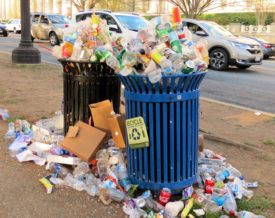 Via Oregon Public Broadcasting, a story that could warm even Oscar’s heart. Researchers at the Pacific Northwest National Laboratory have been dumpster-diving into the data (pdf link) and concluded that the future of home-grown biofuels could be a bunch of garbage. Literally.
Via Oregon Public Broadcasting, a story that could warm even Oscar’s heart. Researchers at the Pacific Northwest National Laboratory have been dumpster-diving into the data (pdf link) and concluded that the future of home-grown biofuels could be a bunch of garbage. Literally.
You see, there’s a steady stream of solid waste coming out of the Northwest’s cities and suburbs. And right now, municipalities pay quite a bit to dispose of it—which means that biomass producers wouldn’t have to pay much to have the waste delivered to them, rather than to landfills.
As a result, solid waste is one of the cheapest biomass sources out there. In fact, the researchers conclude, roughly 70 to 80 percent of the total biomass that’s potentially available for biofuels production in the near term, and at reasonable cost, is solid waste. (Agricultural crop residues add another 10 percent or so, and various forestry byproducts make up the rest.)
Of course, the amount of solid waste that’s available could decline, provided that we get better at the whole reduce-reuse-recycle thing. But until then, the good news is that, as soon as someone figures out how to turn trash into fuel, we could have a new way to power our garbage trucks!!
Photo courtesy of Flickr user Hal Dick under a Creative Commons license.







